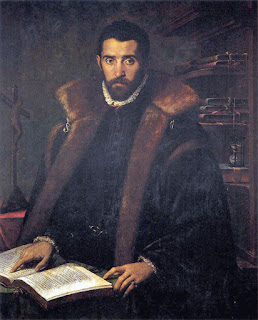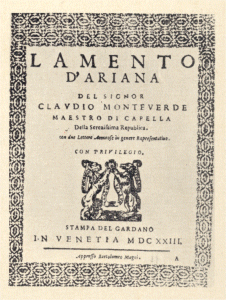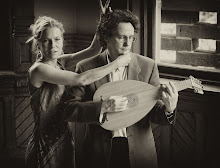Here's the program and notes Mar. 2nd concert, 8PM Heliconian Hall 35 Hazelton Ave. Toronto called You Who Hear in These Scattered Rhymes...
 |
| A manuscript of the first poem in Petrarch's Canzoniere 'Voi che ascoltate... ' You who hear... |
Preludio Terzo Giovanni Kapsberger (c.1580-1651)
Voi ch’ascoltate Sigismondo d’India (c.1582-1629)/Petrarch
Amarilli mia bella Giulio Caccini (1551-1618)/(A. or G.B.) Guarini
Tutto il dì piango Jacopo Peri (1561-1633)/Petrarch
Aria di Fiorenza Kapsberger
Vedrò’l mio sol Caccini/Giovanni Battista Guarini
Torna, deh torna Caccini/Ottavio Rinuccini
O miei giorni fugaci Peri/Rinuccini
Laura Soave Fabritio Caroso (c.1530-after 1605)
Passamezzo Michelagnolo Galilei (1575-1631)
Cantata Sopra la Ciaccona Giovanni Felice Sances (c.1600-79)/Anon.
Donna, I’ vorrei dir molto d’India/Giambattista Marino
Tempesta di dolcezza Giovanni Nauwach (c.1595-c.1630)/Marino
Intermission
Lamento d’Arianna Claudio Monteverdi (1567-1643)/Rinuccini
Corrente detta la Brava/ Pietro Paolo Melli (1579-after 1623)
Corrente detta la Sansona/Alemana detta la Gentile
Saravanda in Varie partite Alessandro Piccinini (1566-c.1638)
O bella destra d’India/Torquato Tasso
Giunto a la tomba d’India/Tasso
Ho visto al mio dolore Biagio Marini (1594-1665)/Alessandro Striggio
Odi Euterpe Caccini/Anon.
 |
| The Harmony of the Planets and the Monochord, which Vincenzo Galilei, and his sons Galileo and Michelagnolo all worked on. |
Claudio Monteverdi famously set his own Orfeo, with a libretto by Striggio, soon after opera's debut as Peri and Caccini's pasticcio. Though he could charm the ear as well as anyone Monteverdi was primarily an intellectual composer. When later in life he was given a text to set which was to be sung by the wind, Monteverdi said ‘Ariadne moved the audience because she was a woman.’ Indeed we are told that in the audience at the first performance of his opera L’Arianna (1608) we are told that ‘not one lady failed to shed a tear.’ Poor Ariadne has been dumped on a beach by her lover and the storms of her shifting emotions are captured by Monteverdi in an inventive tour de force.
Sigismondo d’India was a minor nobleman from Sicily who worked with the poet Marino at the Savoy court. His solo songs match the power of Monteverdi at his best, as evidenced in his setting of Petrarch’s Voi che ascoltate. This setting is almost a microcosm of all the techniques of the new music and the sonnet is carefully divided into its parts and the 'turns' of emotional gestures set by sometimes drastic key changes. Marini, Sances and Nauwach all represent the movement of the new music north of the Alps. Marini worked in Neuberg and Dusseldorf, Sances in Vienna and Giovanni Nauwach was in fact, Johann.
The organization of the music around the hyper-impassioned poetry leads, of course, to rather 'expressionistic' music. Another organizing principal the Baroque used was ground basses. Caccini's Torna uses the Romanesca, or its close relative the Passamezzo Antico. Another famous ground, often heard with its original tune, was taken from a tiny part of huge entertainment for the wedding of Caccini and Peri’s patron, Grand Duke Ferdiniand de’Medici, to Christina of Lorraine in 1589. This tune is sometimes called ‘Ballo della Gran Duca’ or ‘Laura Soave’ or, as in Kapsberger’s version, Aria di Fiorenza.
 |
| Petrarch |
Voi ch’ascoltate - Petrarch
You who hear in scattered rhymes the sound
of those sighs with which I nourished my heart
at the time of my first youthful error,
when I was in part another man from what I am now,
for the varied style in which I weep and speak
between vain hopes and vain sorrow,
where there is anyone who understands love by experience,
I hope to find pity, and not only pardon.
But now I well see how for a long time
I was the talk of the crowd,
for which I often am ashamed within;
and for my raving, shame is the fruit,
and repentance, and the clear knowledge
that whatever pleases in the world is a brief dream.
Amarilli mia bella - Guarini
Amaryllis, my love, do you not believe
you are my heart's desire?
Believe it, and if doubt assails you,
take my arrow, open my breast
and you will find written in my heart:
Amaryllis is my love.
Tutto ’l dí piango - Petrarch
All day I weep: and then in the night
when wretched mortals take their rest,
I find myself weeping, redoubling my ills:
so I spend the time that’s mine in tears.
My eyes are drowned in sad moisture,
the heart with pain: and I am the worst
of creatures, the arrows of love pierce me
so all over, now that peace is exiled.
Alas, with one sun following on another,
one shadow after another, I’ve already passed
the greater part of this death, that they call life.
Another’s failing grieves me more than my own:
that living Pity, and solace of my faith,
sees the fire burning, and will not help me.
Vedrò’l mio sol - Guarini
I will see my sun; I will see, before I die,
That longed for day
That makes your ray come back to me.
O my light, o my joy.
It is sweeter to be in torment for you
Than to be in delight for another.
But without death I will not be able to suffer
Such a long martyrdom
And if I die, so will die my hope ever
To see the dawn of such a beautiful day.
Torna, deh Torna - Rinuccini
Return my little one,
Return, for without you I am without my heart!
Where do you hide, alas? What have I done
That I neither see nor hear you Love?
Fly now to my arms; dissolve that bitter pain
Which consumes my heart.
Hear the plaintive sound of my voice,
Begging forgiveness with tears and sighs.
If I see not, I die not,
But seeing not, I live not;
Therefore I am dead, though not deprived of life.
O, miracle if love, ah, what a strange fate,
That living should be not life or dying death.
 |
| St. Jerome gets blasted by the Trumpet of Doom by Ribera |
O my fleeting days,
O brief life, alas, you have already disappeared.
Now I hear, or seem to hear, the inexorable trumpet
calling me before you,
O just Lord. Already the awesome sound
resounds in my heart:
Lord have mercy on me and forgive me.
Cantata Sopra la Ciacona - Anon.
O pretty warbling birds
upon the breeze disperse
your querulous sounds
and tell of how I grieve,
of how from deep within my breast
sighs heartfelt I send forth.
Go, my languid plaintive sighs,
go to my Lydia with the wind
and tell her that in pain
I waste away without respite.
Perhaps she will now yield,
she who was then unmoved
by my sobbing and my tears.
Perhaps she'll give me peace,
perhaps she'll give me life.
Perhaps, hostile no more,
she'll say that she will grant
both peace and life
to him who was in love so bold.
A cold glance indeed reveals
angelic beauties of the soul.
He drew the dart and tore the veil.
He stole the honour with guileful zeal.
My honour, oh my honour.
Torn is now my veil,
cries out the hapless maiden
with woeful anguished wails.
And you, my sighs, reply to her
Lydia, Lydia, hush down your cries
and a virgin you are still,
for when on you my ardor I did vent
no one was there to see
no one but Lydia, my love, and me.
 |
| Marino |
Woman, I would say so much
but my hesitating tongue is held by Love.
Though my tongue is silent, my glance is begging.
I am as foolish as I am miserable
not knowing what I want.
But you, who are in my heart and mind,
you certainly can read my thoughts
and see in my heart what I might want.
Tempesta di dolcezza - Marino
A tempest of sweetness
is what Love pours out upon my soul
while I kiss you, oh my treasure.
Languishing, I die.
A flood of kisses has submerged my soul.
Already from your lip,
at the sweet sonorous thunder
behind the lightning of your laughter
the thunderbolt of your tooth
has killed me.
 |
| Ariadne got married to Bacchus later and lived happily ever after. |
Let me die, Let me die!
Whom would you wish to comfort me
In such a hard fate,
In such a great suffering?
Let me die!
O Theseus, my Theseus!
For I want to call on you, since you are mine.
Though, alas, cruel man, you flee from my sight.
Turn back my Theseus,
Oh God, turn back and look once more upon her
Who abandoned her country and her kingdom for your sake.
And who now on these shores,
A prey to pitiless wild beasts,
Will leave her bare bones!
O Theseus, my Theseus!
If you knew, Oh God, alas the torment
Of miserable Ariadne, Perhaps, in remorse,
Even now you would turn back your prow to shore.
But with gentle breezes you go happily on,
While I remain, weeping,
Athens prepares you greet you with joyful festivities,
While I remain, weeping, a prey to the wild beats of these lonely shores.
Both your aged parents will embrace you with joy
But I will see you no more, O mother, O my father.
Where, where is the faith you so often swore to me?
Is this how you restore me to my ancestor’s ancient throne?
Are these the crowns with which you adorn my hair?
Are these the sceptres, are these the jewels and the gold?
To leave me abandoned,
To be torn by and devoured by wild beasts?
Ah, Theseus, O my Theseus,
Will you leave me to die and weep in vain crying for help,
Poor wretched Ariadne, who gave you her trust, glory and life?
Oh! you don’t even reply! To my lament his ears are as deaf as a serpent’s
O, storms, O hurricanes, O Gales
Push him down beneath the waves!
Hurry sea-monsters and whales
Fill the bottomless deep with his foul limbs.
What am I saying? Why an I raving?
Alas! Wretch that I am, what do I want?
O Theseus, O my Theseus,
It was not I who uttered those savage words.
My grief spoke, my anguish spoke,
My tongue spoke, yes, but not my heart!
Unhappy woman, I still give way
To my betrayed hope, and still
After so much scorn, the fires of love are not quenched!
O death, now extinguish the worthless flames!
O mother, O father, O proud homes of the ancient kingdom where my golden cradle rested.
O servants, O faithful friends (Ah unworthy fate)
See where wicked fate has led me.
See the grief I have inherited from my love, my trust and his deceit.
One who loves too well and trusts too much such a fate endures.
 |
| Tasso |
O beautiful right hand that offered me
sweet assurance of friendship and of peace,
look at you now...how can you suffer me?
And how, you loveliest limbs...are not these
the evidence of my beastlike enmity,
and sad and deadly signs of wickedness?
O my eyes, wicked as my hands, to gaze
upon the wounds that they have made.
Giunto ala tomba - Tasso
He reached the tomb, the prison house where heaven
had ordained for his living soul to dwell,
and on the stone he fixed his eyes, cold, wan,
speechless and still as if insensible.
At last he broke into a languid sigh,
Alas, as a river of weeping broke the spell.
‘O stone to highly loved, and honoured, keeping
my spirit’s flames within, without, my weeping.’
Ho visto al mio dolore - Striggio
I saw, to my grief,
shedding thousands by thousands,
from her pitiful eyes, dewy drops,
the gentle Silvia;
such as never shed before
when stung by pain to the heart
over the dead Adonis
was the love goddess.
And miserable me, who
from such water my fire takes strength,
and it inflames me all the more.
 |
| St. Cecilia with Alabaster Apple and Theorbo |
Hear, Euterpe, the lovely song
that Love urges me to compose
and help me attune to these sweet accents
the strings of my golden lyre.
Sweet Love whispers to me verses
and compels me to sing sweetly.
My fair Lydia covered her bosom
with the chaste veil of night
but the moon high in the sky
uncovered it and I beheld
a wondrous treasure
brightly lit by golden flames.
Your fair bosom thus unveiled
cast out radiant flames asparkle.
While your bosom I admired
with its golden fire ablazing
I beheld in so much splendour
other treasures to desire.
Oh my Lydia, your bright eyes
shine more splendid than the sun.
They cast light upon your bosom
for my own eyes to delight,
the serene glow of your gaze
ever brightening your graces.
My heart was burning sweetly.
Every flame in Lydia's breast
made my eyes rejoice the greater,
and my heart, already wounded,
wanted wounding ever more.
Then my eager gaze was blinded
by the light of many a beauty,
sated it was not by any
restless on it searched for others,
so my eyes... they died of pleasure
on two alabaster apples.



No comments:
Post a Comment